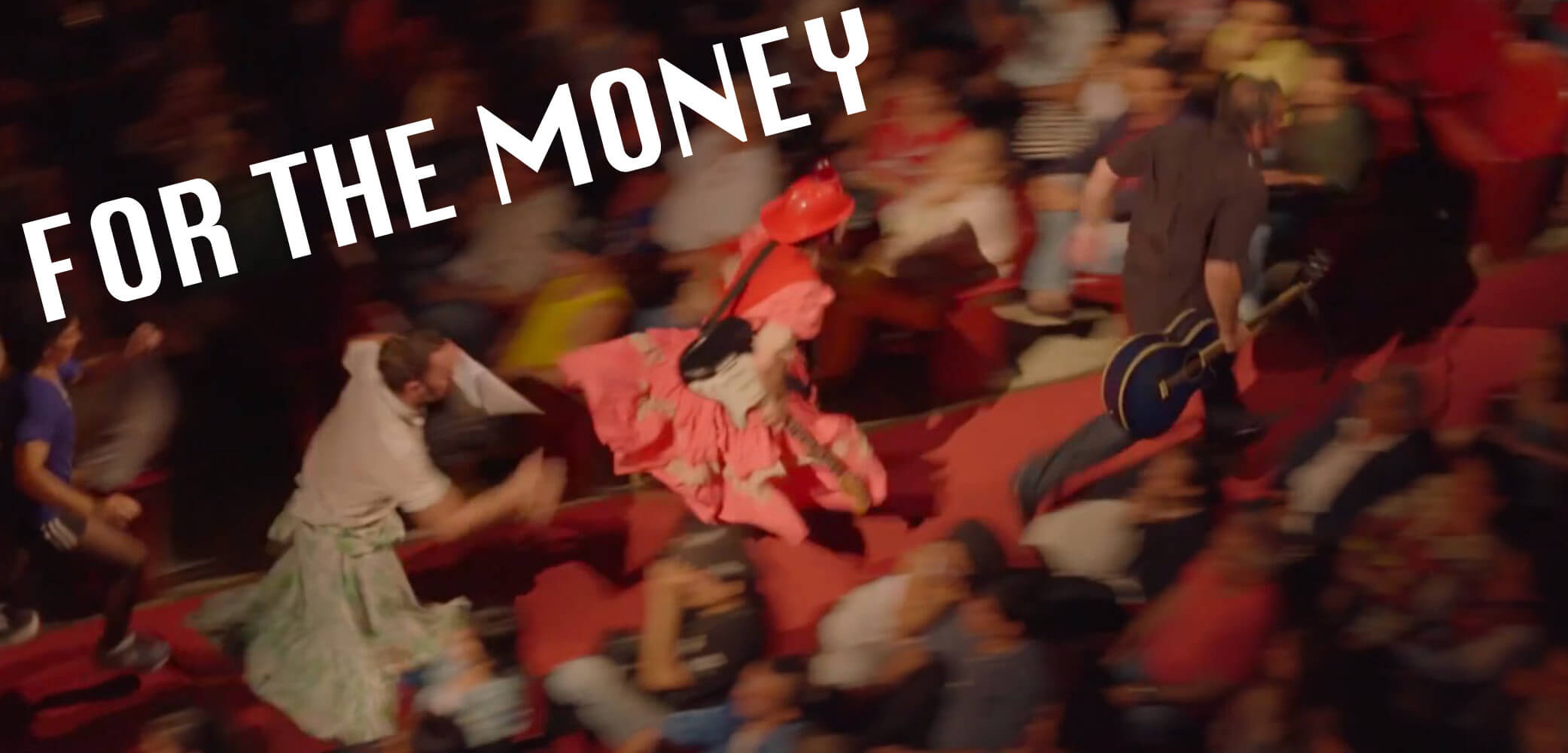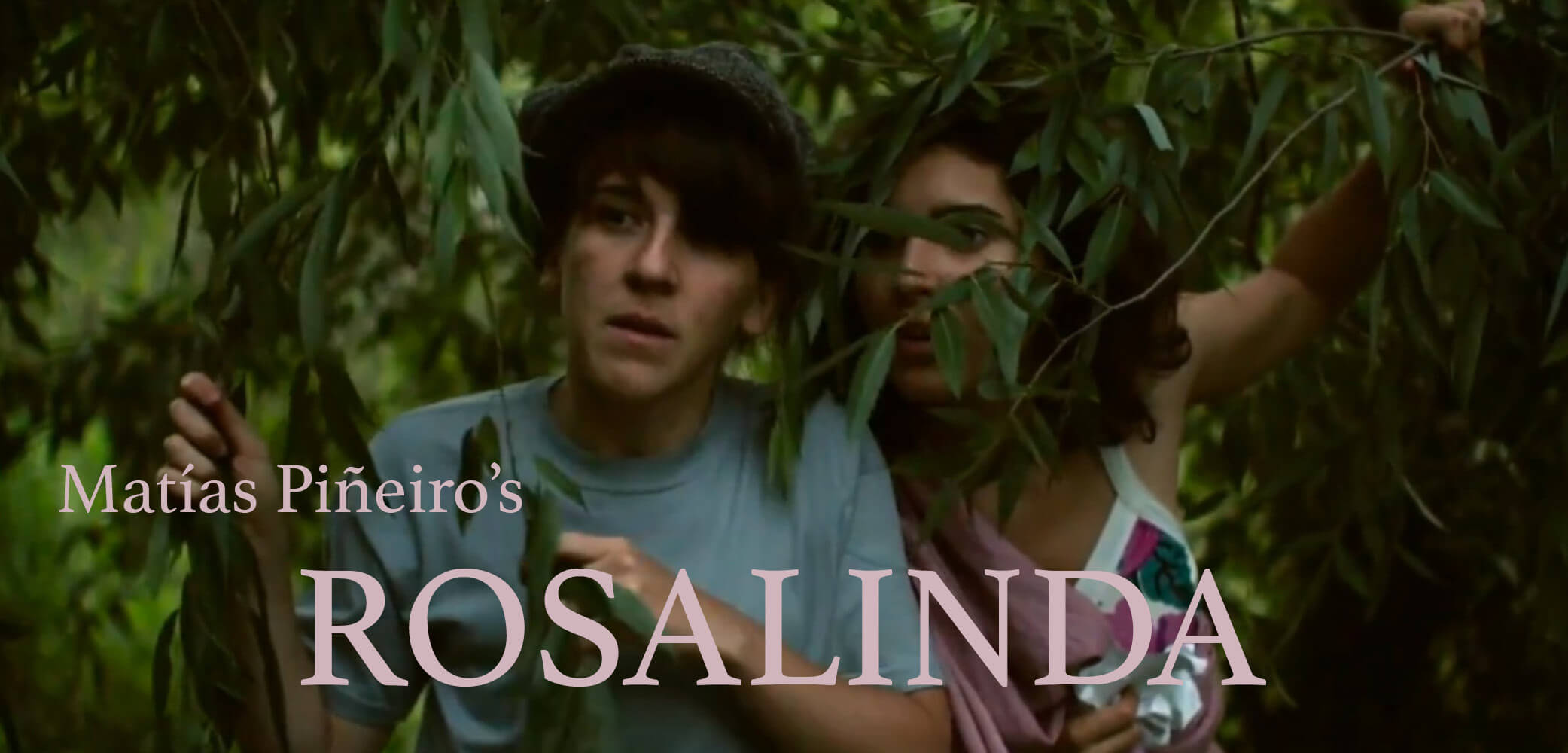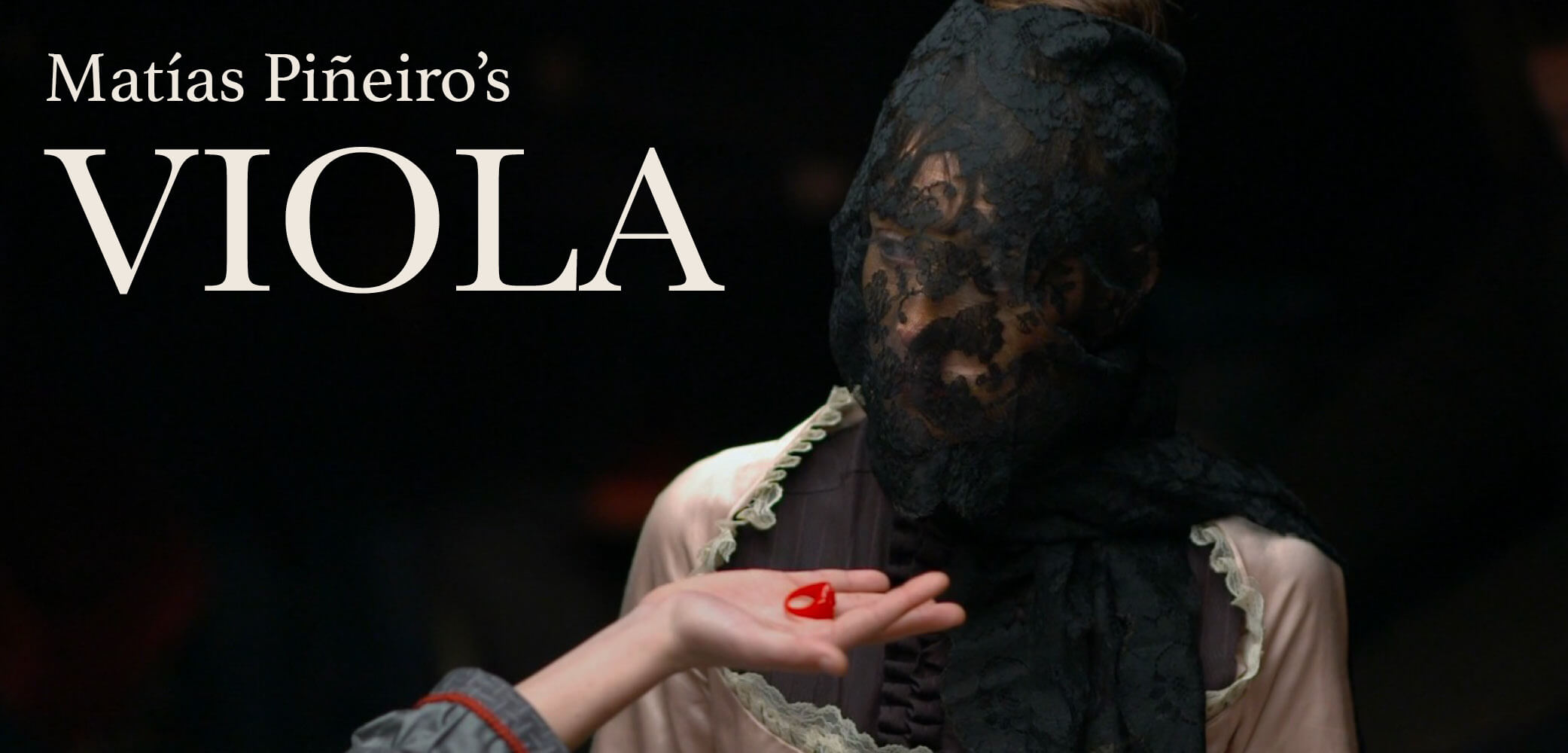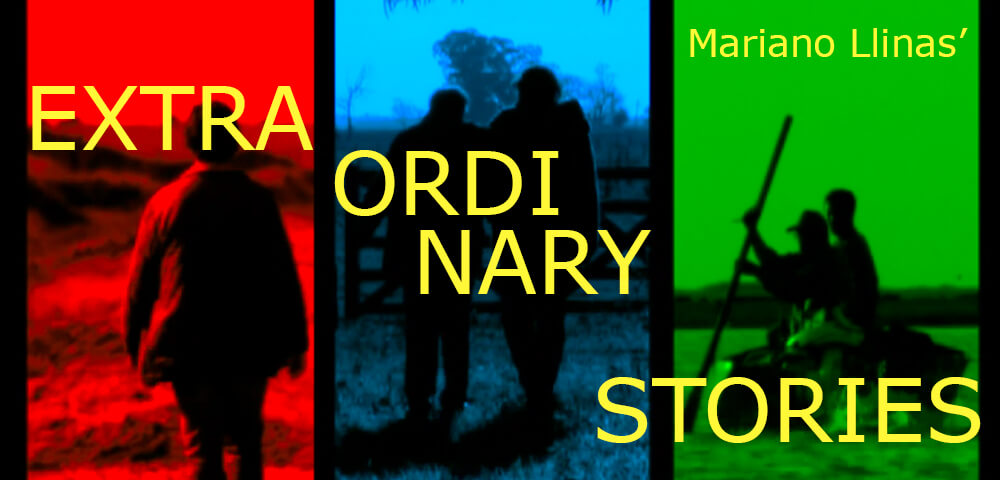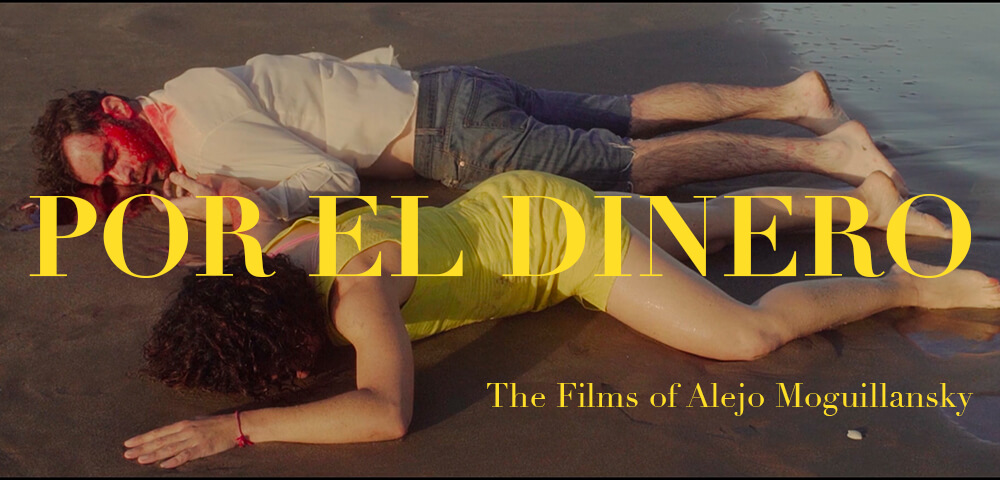
“Your music is not provocative, it is like a game for kids.” – Margarita Fernandez to Helmut Lachenmann, THE LITTLE MATCH GIRL
Wedding narratives stolen from classical fantasy stories (Treasure Island, Swan Lake, Hans Christian Andersen) to documentary-based portraits of artists struggling both creatively and financially, the films of Alejo Moguillansky can be equal parts Marxist and childish. Thriving on a playful dialectical struggle between truth and fiction, reality and fantasy, comedy and tragedy, content and form, aural and visual space – Moguillansky’s films are in a state of constant exploration. From THE PARROT AND THE SWAN wherein the main character is also the film’s boom operator and the idea of cinematic subjectivity is taken comically new heights to FOR THE MONEY where Moguillansky’s real-life entry into a Colombian theater competition is imagined as the harbinger of insatiable greed and, ultimately, his own death – the very processes of making a film is often the jumping off point for the film itself, leaving the movie to discover and construct its own aesthetic terrain as it unfolds.
In addition to his work as a director Alejo Moguillansky is also one of the founding members of the Argentinian film collective El Pampero Cine with filmmakers Mariano Llinas, Laura Citrella, and Andres Mendilaharzu. Founded on a commitment to independence and collaboration, the films of El Pampero are usually produced without institutional financing from grants or government funding, using the collective’s own equipment and the founding members of the collective serve in important creative roles on each other’s projects. As part of this series we are proud to show a number of other films which Alejo Moguillansky worked on as an editor – Mariano Llinas’ micro-budget four-hour long Borgesian epic EXTRAORDINARY STORIES, Laura Citrella’s bitterly funny resort-set noir OSTENDE, and the first two films of Matias Pinero’s Shakespeare series, ROSALINDA and VIOLA. As evidenced by the prominent acting roles often given to his crew members, the films of Moguillansky thrive on collaborative creativity and these films feel as much a part of his body of work as his own.
Co-presented with Cinema Tropical. Special thanks to El Pampero Cine and Itala Aguillera.
THE LITTLE MATCH GIRL
(La Vendedora De Fósforos)
Dir. Alejo Moguillansky, 2017
Argentina. 70 mins.
In Spanish with English subtitles.
THURSDAY, DECEMBER 2 – 10 PM
SUNDAY, DECEMBER 5 – 7:30 pm
WEDNESDAY, DECEMBER 15 – 7 PM w/remote Q+A!
(This event is $10.)
TUESDAY, DECEMBER 21 – 7:30 PM
Andersen’s matchstick saleswoman who dies of cold on New Years Eve.
Bresson’s donkey from AU HASARD BALTHAZAR who changes its owner time and time again with the tragic fate and finale of a workhorse.
The impossible reconciliation between a German soldier from the Red Army Faction and a delicate Argentine pianist who plays the piano without striking the keys.
The modernist composer Helmut Lachenmann, veteran of the vanguard wars of the XXth century, trying to put together a demented opera with the orchestra of the Colon Theatre.
A transportation strike in Buenos Aires. Politicians trying to negotiate with the orchestra.
In the middle of this, Maria Villar and Walter Jakob inhabit this comedy trying to maintain their young daughter (Cleo Moguillansky) with nothing but the improbable salary that music provides them. They rehearse ideas for the staging of Lachenman’s opera where they work and complete the frieze of marginal figures to which this ode to resistance is dedicated.
plays with
ALEJO MOGUILLANSKY TO MICHAELANGELO ANTONIONI
Dir. Alejo Moguillansky, 2021
Argentina. 17 minutes.
In Spanish and Italian with English subtitles.
Garbiñe Ortega, the artistic director of Punto de Vista, devised the creation of a collective audiovisual project called Las cartas que no fueron también son in which several filmmakers will make a filmed letter addressed to another filmmaker in the history of cinema that they did not know personally and who was as far away as possible from their own cinema. For Alejo Moguillansky’s submission to this series he created a letter to the iconic Italian filmmaker, Michelangelo Antonioni.
FOR THE MONEY
(Por El Dinero)
Dir. Alejo Moguillansky, 2019
Argentina. 79 minutes.
In Spanish and French with English subtitles.
THURSDAY, DECEMBER 2 – 7:30 PM
TUESDAY, DECEMBER 10 – 10 PM
THURSDAY, DECEMBER 16 – 7 PM with remote Q+A
(This event is $10.)
SUNDAY, DECEMBER 19 – 5 PM
“We were workers of luxury. And nobody was rich enough to pay us. We had to be at the same time the actor and the cameramen. We had to be at the same time the painter and their muse. The poet and the landscape. The rifle and its prey. The rider and the horse. Don Quixote and Cervantes all at once.”
Invited by the Argentinean government to make a short documentary about the staging of his independent play, Por El Dinero, Moguillansky took the money and equipment and instead made an absurd heist film about the vicious allure of money. Casting the actors of the original production as themselves (including Moguillansky himself), the film follows a critically-lauded theater troupe stuck wallowing in obscurity and financial debts until a theater festival in Colombia invites them to perform their play. While the show mainly consists of each actor giving a long rundown of everything they have ever made or spent while the rest of the ensemble perform silly dances and sing punk songs about how much they hate money, as soon as the troupe discovers that the festival has a big cash prize for the best play, greed predictably sets in. Tragedy, comedy, and bare-bones reenactments of Asterix and Obelix ensue.
ROSALINDA
dir. Matías Piñeiro, edited by Alejo Moguillansky, 2011
43 mins. Argentina.
In Spanish with English subtitles.
SATURDAY, DECEMBER 5 – 5 PM
TUESDAY, DECEMBER 7 – 7:30 PM
THURSDAY, DECEMBER 9 – 10 PM
TUESDAY, DECEMBER 21 – 10 PM
The first in Matias Piñeiro’s series of films inspired by the female roles in Shakespeare’s comedies, Rosalinda delves deep into games of desire and romantic roleplaying. Following a group of young actors rehearsing As You Like It on an idyllic island during the summer, the film stars María Villar as Luisa who plays the character of Rosalinda who, in Shakespeare’s play, pretends to be the male Ganymede to escape persecution and play romantic games with her lover Orlando who is played by Gabo (Alberto Ajaka). Yet who’s playing who seems to shift endlessly as all the actors try on various parts, ceaselessly hop from romantic partner to romantic partner, and go for bucolic swims that feel removed from time. All while Luisa waits for a phone call from her lover who may or may not be coming and who she may or may not be breaking up with.
plays with
UN DIA DE CAZA
dir. Alejo Moguillansky, 2021
32 mins. Argentina.
In Spanish with English subtitles.
Manic tourists face off with camo-clad hunters all while real vacationers watch in the background in this Tatiesque piece of complete, cartoonish absurdity.
VIOLA
dir. Matías Piñeiro, edited by Alejo Moguillansky, 2012
Argentina. 60 minutes.
In Spanish with English subtitles.
FRIDAY, DECEMBER 3 – 7:30 PM
WEDNESDAY, DECEMBER 8 – 7:30 PM
SATURDAY, DECEMBER 11 – MIDNIGHT
SUNDAY, DECEMBER 19 – 7:30 PM
The second film in Piñeiro’s ongoing Shakespeare series takes an abstracted, dreamlike approach to desire and romantic entanglement. Piñeiro regular Agustina Muñoz plays Cecilia, an actress playing Viola in Shakespeare’s Twelfth Night who hatches a plan to seduce the actress playing Olivia, Sabrina (Elisa Carricajo) so that she can prove her own theories around desire and romance. Meanwhile Viola (María Villar, Piñeiro’s other leading regular) bikes around Buenos Aires delivering packages of pirated DVDs to various men who each have an ambiguous attraction to her. How these two Violas are related is never elaborated, yet chance and the inexplicable flow of Piñeiro’s wavy narrative weave them together in an elegiac riff on longing and seduction.
“[A] sensation of pleasant confusion recurs throughout VIOLA, which might be described as an ensemble romantic comedy but at the same time doesn’t seem beholden to any genre. Argentinean director Matías Piñeiro’s sophomore feature dares to disorient its audience from the first scene onward. But it’s not an obtuse film. Although it is filled with mysteries, it is not asking to be decoded. Instead, Viola invites us to submit to its pleasures, which are ample and ultimately very simple. In lieu of stylistic fireworks or some sort of grand thesis statement, Piñeiro offers us nothing less than a window on extreme beauty, which radiates through the faces of his actresses and the Shakespeare plays that they intermittently recite in a variety of contexts: as dialogue in stage productions, as lines being rehearsed in private, and as words interpolated into everyday conversation.” – Adam Nayman, Reverse Shot
EXTRAORDINARY STORIES
(HISATORIAS EXTRAORDINARIAS)
dir. Mariano Llinas, 2008
Argentina. 242 minutes.
In Spanish with English subtitles.
SUNDAY, DECEMBER 12 – 5 PM
As though it was a sort of encyclopedia of adventure fiction, this film takes as a start three classically used triggers. One: A man who gets accidentally involved in a case of assassination; Two: another man (a smalltown bureaucrat) who gets obsessed with another man, whose life becomes a crescently problematic riddle; Three: A Jules Verne styled challenge takes place in a sort of gentlemen club in the deep argentine country side; that challenge ( a remotely scientific orientated challenge) involves a third man in an unexpected odyssey down a river that run through the lonely plains. Those triggers (that, following Borges path, combine the universe of Stevenson and the universe of the pampas) craft a complex and surreal plot, a plot that somehow includes, in the same argentine universe, explosions that take place for no one in the middle of the plains, forsaken lions that die in forsaken buildings, remote world war II stories, stories of love and glory, stories of brilliant men and of forgotten men, and those of men both brilliant and forgotten. Hundreds of stories, altogether in a plot that, more than a film, become a sort of essay about fiction: How fiction works, where does fiction come from and what the real purpose of fiction is.


